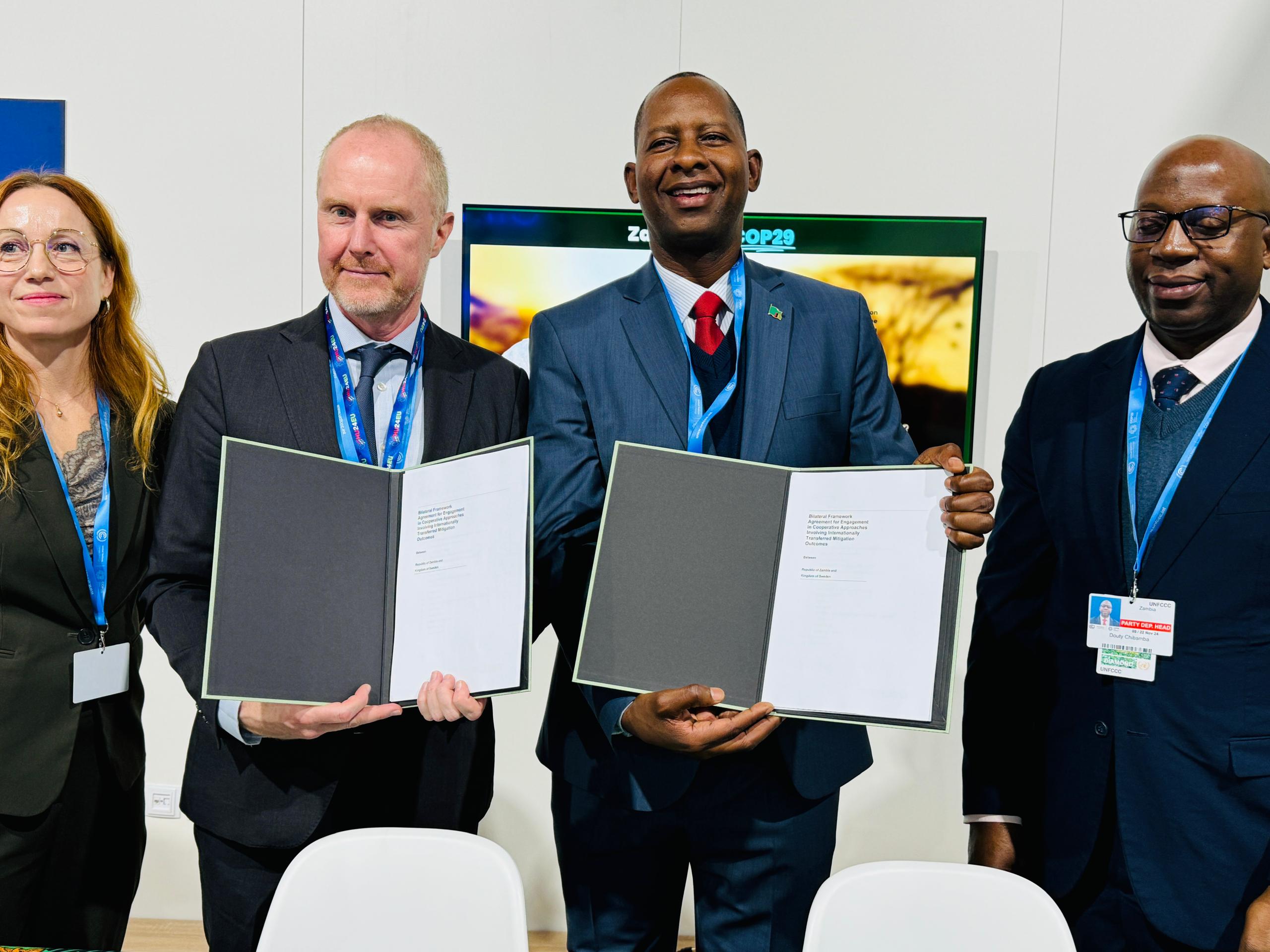
By Happy Mulolani
The ongoing Conference of Parties (COP29) negotiations in Baku, Azerbaijan provide hope, as Zambia signed bilateral agreements with Norway and Sweden, this week.
The Bilateral agreements is expected to ease the climate shocks that continue to daunt the country’s various sectors.
In a statement, Zambia has made drastic strides towards Article 6 cooperation of the Paris Agreement.
“In two landmark events for Zambia towards Article 6 cooperation of the Paris Agreement and continued action towards climate change, the country, represented by the Ministry of Green Economy and Environment (MGEE), signed bilateral agreements with Norway and Sweden at COP29 in Baku, under its current engagement with buyer countries for carbon credits,” the statement states.
The agreements are premised on the Paris Agreement signed by 197 countries in 2015 representing a historic global effort to combat climate change by limiting global warming to below 2 degrees Celsius above pre-industrial levels.
“Article 6 of the Paris Agreement is the cornerstone for international cooperation, fostering global carbon market mechanisms to ensure countries reduce greenhouse gas emissions, but also fostering sustainability,” reads the statement in part.
Currently, Zambia is grappling with an energy deficit due to a myriad of factors, including the growing demand for electricity and limited investments in the energy sector. With the severe drought and high dependence on hydropower, the capacity of its hydroelectric power plants to generate enough power to support economic growth has significantly been affected.
In its continued efforts, the Government of Zambia through the Ministry of Energy and Ministry of Green Economy and Environment has been exploring alternatives and also looking at options of “renewable energy and energy efficiency options to support the country’s efforts in power generation and low carbon power sector development.”
Consequently, the Government of Zambia signed a Bilateral Agreement for Article 6 Cooperative Approaches with Norway. Zambia’s Minister of Green Economy and Environment Mike Mposha stated that the agreement signifies cooperation towards climate action, emission reduction, and achieving global targets.
Speaking at the same event, Norwegian Minister of Climate and Environment Tore Onshuus Sandvik reiterated, “Norway believes cooperation under Article 6 can provide much needed finance for green investments in developing countries. This agreement paves the way for green investments in Zambia and contributes to global mitigation ambitions.”
While, on Monday 18 November 2024, the Zambian government represented by Ministry of Green Economy and Environment Permanent Secretary Dr Douty Chibamba signed a bilateral agreement with Sweden’s Swedish Energy Agency. This signing was a culmination of months of engagement between the two countries, including a Memorandum of Understanding (MoU) in August 2024.
“The Swedish Energy Agency is one of Sweden’s key expert government agencies which promotes energy efficiency measures and investments in renewable energy technologies…mandated to implement climate cooperation under Article 6 of the Paris Agreement.”
Signing on behalf of the Government of Sweden, Acting Director General of the Swedish Energy Agency Caroline Asserup, emphasized that the bilateral cooperation agreement is a great step in establishing concrete climate projects that reduce climate ambition in both Sweden and Zambia and further strengthen their cooperation.
Mr Mposha asserted that the government is serious about participating in international carbon markets, as it is a key avenue to achieve Zambia’s nationally determined contributions.
“Generate new carbon finance revenue streams, which will increase the country’s mitigation ambition and contribute to the sustainable development of our nation.”
Mr Mposha commended both Norway and Sweden for their continued commitment towards climate action.
The signing of the bilateral agreements will position Zambia differently and open up opportunities for both public and private sector energy project developers to access carbon finance, while also pursuing renewable power generation.
“Both events were supported by the Supporting Preparedness for Article 6 Cooperation (SPAR6C) Program, led by the Global Green Growth Institute (GGGI) with GFA Consulting Group and UNEP Copenhagen Climate Centre as the leading delivery partners in Zambia. SPAR6C aims to catalyse investment in greenhouse emissions reductions by supporting its implementation countries to enable transactions of Internationally Transferred Mitigation Outcomes (ITMOs) as allowed under Article 6 of the Paris Agreement. Over the past two years, Zambia has progressed in the development of its carbon market framework and is in the process of developing first mitigation activities with the support of SPAR6C.”
